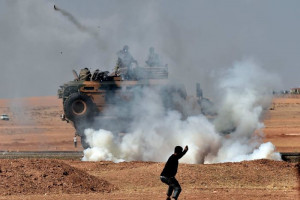A wave of protests in the Turkish province of Mersin last Friday, when protesters set fire to the headquarters of the Turkish Peoples’ Democratic Party, resulted in the injury of four policemen. In previous days, protests broke out in the Turkish provinces of Diyarbakir, Mardin, Siirt, Mus, Van and Batman. They were provoked by Ankara’s reluctance to alter its policy of non-interference in the developments in Kobani, the better part of which had already been captured by militants of the Islamic State organization. The protest movement, composed mainly of the local Kurdish population and supporters of the Kurdistan Workers‘ Party, attacked municipal buildings and businesses alike. Schools suspended classes due to the civil unrest. Consequently, Turkey’s military imposed a curfew in all of the above named regions.
The initial clashes in Turkey have left at least 22 people dead. On Friday morning Turkish hospitals reported that a total of 10 people died overnight due to fatal injuries, that had been inflicted in previous days. It has also been said that two Saudis citizens were found among the dead, killed by the enraged supporters of the Kurdistan Workers‘ Party.
Since the very beginning of the clashes between the Kurdish nationalists and police units protesters had been using Molotov cocktails. But policemen were not the only target, a tragic set of events in the city of Diyarbakir, where the Kurdistan Workers’ Party supporters engaged members of the local version of the Hezbollah party, 10 people were shot to death.
But the conflict in Syria‘s Kobani isn’t the only reason behind the Kurdish unrest. Recently the leader of the Kurdistan Workers’ Party Abdullah Ocalan, now in jail, has made an announcement that due to the fact that the Turkish government has failed in establishing an effective mechanism of Kurdish involvement in government affairs, the protests will be carried on if the government fails to engage in negotiations by October 15.
Turkish authorities are trying to stabilize the situation by urging the local Kurdish community not to speculate on events in Iraq and Syria in the process of reaching a settlement. Turkey’s president Tayyip Erdogan called the protests a “blackmail” in the making. Many Turkish political analysts believe that the outbreak of inter-ethnic hostility is aimed at drawing Ankara into a conflict between the Syrian Kurds and ISIL militants. Assumptions are being made that the sudden rise of Kurdish nationalism is the making of the United States and Saudi Arabia, planning to use Kurdish separatism in order to draw the Turkish army in a ground operation against the Islamic State in Iraq and Syria. This scenario may facilitate the toppling of Bashar al-Assad for the West and its allies. All across Turkey instigators are spreading rumors that a total of seventy thousand Turkish soldiers are stationed near the Syrian border, prepared to assault Aleppo. However, there is another opinion – someone wants to bait ISIL into a war with Turkey in order to undermine the stability of the state, which has recently carried out a “far too independent” policy in the region, and in its relations with Russia. And again, this will benefit the United States. However, Ankara is not going to succumb to these provocations, saying that NATO should be carrying out a ground operation against the Islamic State, while Turkey can only provide its allies with the territory and the infrastructure needed for this war.
Sources close to Tayyip Erdogan and high ranking Turkish intelligence officials say that they’ve obtained intelligence on the plans of the United States in the region. According to these sources the operation against ISIL pursues a single goal – to bring down the Assad regime and undermine Tehran in order to make it “more obedient”. Western think tanks might be aiming to create a Kurdish state with a population of around 30 million people that will emerge in the Middle East from the fight against the ISIL militants. This can bring a fundamental change to the balance of forces in the region where the West was forced to take into account the positions of the key players: Iran, Turkey, Saudi Arabia and Israel. A Kurdish state, given the attitude of the Kurds towards the Turks, Persians and Arabs, will inevitably become a counterweight to Ankara, Iran, Iraq and Syria. And this will certainly be beneficial to the United States and Israel.
So the White House has launched a military operation under the pretext of fighting terrorism, while in fact it has been pursuing it own geopolitical interests. Its steps are designed to maintain and even strengthen the position of the United States in this strategically important region – the world’s main source of hydrocarbons. And it seems that Turkey figured it all out, unlike Saudi Arabia, UAE and Jordan.
Should Ankara continue to adhere to the principles of non-interference in the military conflict against ISIL, and should Tehran refrain from supporting the “coalition”, Washington would be forced to withdraw, without attaining its objectives. And then the region will be able to breathe easier, since local players are more than capable of getting rid of terrorism on their own.
Viktor Titov, Ph.D in Historical Sciences and political commentator on the Middle East, exclusively for the online magazine New Eastern Outlook
